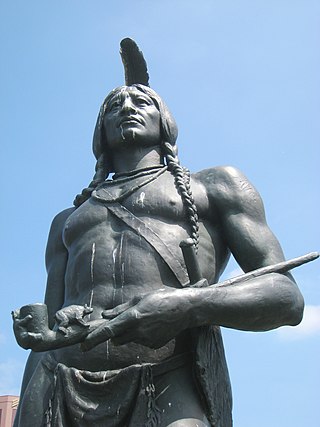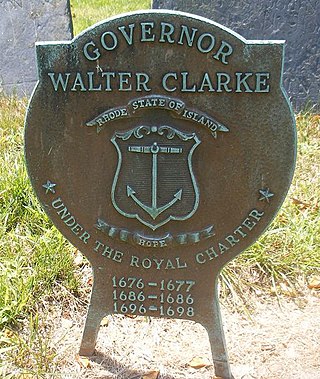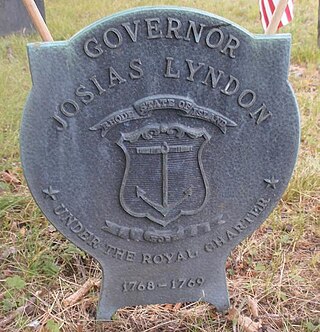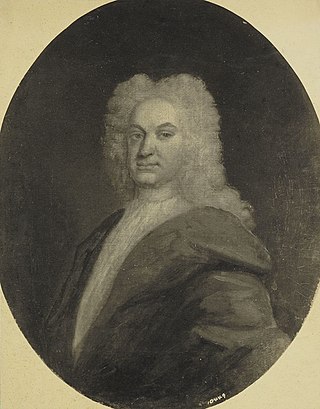
Stephen Hopkins, a Founding Father of the United States, was a governor of the Colony of Rhode Island and Providence Plantations, a chief justice of the Rhode Island Supreme Court, and a signer of the Continental Association and Declaration of Independence. He was from a prominent Rhode Island family, the grandson of William Hopkins who was a prominent colonial politician. His great grandfather Thomas Hopkins was an original settler of Providence Plantations, sailing from England in 1635 with his cousin Benedict Arnold who became the first governor of the Rhode Island colony under the Royal Charter of 1663.

The Colony of Rhode Island and Providence Plantations was one of the original Thirteen Colonies established on the east coast of America, bordering the Atlantic Ocean. It was founded by Roger Williams. It was an English colony from 1636 until 1707, and then a colony of Great Britain until the American Revolution in 1776, when it became the State of Rhode Island and Providence Plantations.

John Clarke was a physician, Baptist minister, co-founder of the Colony of Rhode Island and Providence Plantations, author of its influential charter, and a leading advocate of religious freedom in America.

Massasoit Sachem or Ousamequin was the sachem or leader of the Wampanoag confederacy. Massasoit means Great Sachem. Massasoit was not actually his name but a title. English colonists mistook Massasoit as his name and it stuck.

Samuel Gorton (1593–1677) was an early settler and civic leader of the Colony of Rhode Island and Providence Plantations and President of the towns of Providence and Warwick. He had strong religious beliefs which differed from Puritan theology and was very outspoken, and he became the leader of a small sect known as Gortonians, Gortonists, or Gortonites. As a result, he was frequently in trouble with the civil and church authorities in the New England colonies.

Samuel Ward was an American farmer, politician, Rhode Island Supreme Court justice, governor of the Colony of Rhode Island and Providence Plantations, and delegate to the Continental Congress where he signed the Continental Association. He was the son of Rhode Island Governor Richard Ward, was well-educated, and grew up in a large Newport, Rhode Island, family. After marrying, he and his wife received property in Westerly, Rhode Island, from his father-in-law, and the couple settled there and took up farming. He entered politics as a young man and soon took sides in the hard-money vs. paper-money controversy, favoring hard money or specie. His primary rival over the money issue was Providence politician Stephen Hopkins, and the two men became bitter rivals—and the two also alternated as governors of the colony for several terms.

William Coddington was an early magistrate of the Massachusetts Bay Colony and later of the Colony of Rhode Island and Providence Plantations. He served as the judge of Portsmouth and Newport, governor of Portsmouth and Newport, deputy governor of the four-town colony, and then governor of the entire colony. Coddington was born and raised in Lincolnshire, England. He accompanied the Winthrop Fleet on its voyage to New England in 1630, becoming an early leader in Boston. There he built the first brick house and became heavily involved in the local government as an assistant magistrate, treasurer, and deputy.

Thomas Williams Bicknell was an American educator, historian, and author.

Nicholas Cooke was a governor of the Colony of Rhode Island and Providence Plantations during the American Revolutionary War, and after Rhode Island became a state, he continued in this position to become the first Governor of the State of Rhode Island. Born in the maritime town of Providence, he early in life followed the sea, eventually becoming a Captain of ships. This occupation led him to become a slave trader, becoming highly successful in this endeavor, and he ran a distillery and rope-making business as well. He is depicted as one of the affluent merchants in John Greenwood's satirical painting from the 1750s entitled Sea Captains Carousing in Surinam.

Benedict Arnold was president and then governor of the Colony of Rhode Island and Providence Plantations, serving for a total of 11 years in these roles. He was born and raised in the town of Ilchester, Somerset, England, likely attending school in Limington nearby. In 1635 at age 19, he accompanied his parents, siblings, and other family members on a voyage from England to New England where they first settled in Hingham in the Massachusetts Bay Colony. In less than a year, they moved to Providence Plantation at the head of the Narragansett Bay at the request of Roger Williams. In about 1638, they moved once again about five miles (8 km) south to the Pawtuxet River, settling on the north side at a place commonly called Pawtuxet. Here they had serious disputes with their neighbors, particularly Samuel Gorton, and they put themselves and their lands under the jurisdiction of Massachusetts, a situation which lasted for 16 years.
John Easton (1624–1705) was a political leader in the Colony of Rhode Island and Providence Plantations, devoting decades to public service before eventually becoming governor of the colony. Born in Hampshire, England, he sailed to New England with his widowed father and older brother, settling in Ipswich and Newbury in the Massachusetts Bay Colony. As a supporter of the dissident ministers John Wheelwright and Anne Hutchinson during the Antinomian Controversy, his father was exiled, and settled in Portsmouth on Aquidneck Island with many other Hutchinson supporters. Here there was discord among the leaders of the settlement, and his father followed William Coddington to the south end of the island where they established the town of Newport. The younger Easton remained in Newport the remainder of his life, where he became involved in civil affairs before the age of 30.

Joseph Wanton Sr. was a merchant and governor in the Colony of Rhode Island and Providence Plantations from 1769 to 1775. Not wanting to go to war with Britain, he has been branded as a Loyalist, but he remained neutral during the war, and he and his property were not disturbed.

Jeremy Clarke (1605–1652) was an early colonial settler and President of the Colony of Rhode Island and Providence Plantations. Born into a prominent family in England, he was a merchant who came to New England with his wife, Frances Latham, and four stepchildren, settling first at Portsmouth in 1638, but the following year joining William Coddington and others in establishing the town of Newport. Here he held a variety of civic positions until 1648 when Coddington's election as President of the colony was disputed, and Clarke was chosen to serve in that office instead. He was the father of Walter Clarke, another colonial governor of Rhode Island, and also had family connections with several other future governors of the colony.

Walter Clarke (1640–1714) was an early governor of the Colony of Rhode Island and Providence Plantations and the first native-born governor of the colony. The son of colonial President Jeremy Clarke, he was a Quaker like his father. His mother was Frances (Latham) Clarke, who is often called "the Mother of Governors." While in his late 20s, he was elected as a deputy from Newport, and in 1673 was elected to his first of three consecutive terms as assistant. During King Philip's War, he was elected to his first term as governor of the colony. He served for one year in this role, dealing with the devastation of the war, and with the predatory demands of neighboring colonies on Rhode Island territory during the aftermath of the war.
Henry Bull (1610–1694) was an early colonial Governor of Rhode Island, serving for two separate terms, one before and one after the tenure of Edmund Andros under the Dominion of New England. Sailing from England as a young man, Bull first settled in Roxbury in the Massachusetts Bay Colony, but soon became a follower of the dissident ministers John Wheelwright and Anne Hutchinson, and was excommunicated from the Roxbury church. With many other followers of Hutchinson, he signed the Portsmouth Compact, and settled on Aquidneck Island in the Narragansett Bay. Within a year of arriving there, he and others followed William Coddington to the south end of the island where they established the town of Newport.

William Greene Sr. was a governor of the Colony of Rhode Island and Providence Plantations. He was a clerk of the county court in Providence, deputy from Warwick, speaker of the Rhode Island Assembly, and then deputy governor from 1740 to 1743. He became governor for the first time in 1743 and served four separate terms for a total of 11 years, and died while in office during his final term.

Josias Lyndon was a governor of the Colony of Rhode Island and Providence Plantations, serving for a single one-year term.

Joseph Jenckes was a deputy governor and governor of the Colony of Rhode Island and Providence Plantations.

The Rhode Island Royal Charter provided royal recognition to the Colony of Rhode Island and Providence Plantations, approved by England's King Charles II in July 1663. It outlined many freedoms for the inhabitants of Rhode Island and was the guiding document of the colony's government over a period of 180 years.
Thomas Hopkins (1616–1684) was an early settler of Providence Plantations and the great grandfather of brothers Esek Hopkins, the only Commander in Chief of the Continental Navy during the American Revolutionary War, and Stephen Hopkins who was many times colonial governor of Rhode Island and a signer of the Declaration of Independence.

















